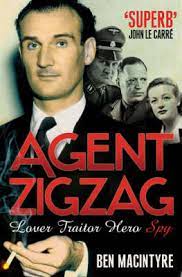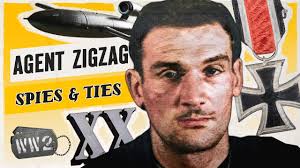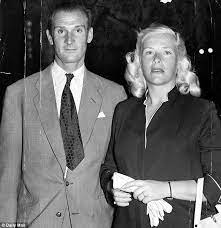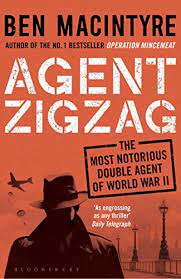Agent ZigZag (2007) by Ben Macintyre
GoodReads meta-data is 364 pages, rated 4.13 by 17,490 litizens.
Genre: Biography.
DNA: Brit.
Verdict: Strange but true.
Tagline: An Iron Cross, believe it or not.

Eddie Chapman was a rough diamond who early discovered his talent for crime and honed it. He was a versatile criminal who burgled houses while the owner slept; he mastered the use of gelignite to open safes in businesses; drove cars into showroom windows to snatch fur coats and more. He was handsome and had learned to affect the purple, though he had not been born to it, and anyone who had been would realise he wasn’t, but the veneer worked its magic often enough on others to sustain his career of crime.
With an accumulated fourteen years of imprisonment on his card, he broke bail and ran to the island of Jersey in the English Channel with Betty. He was 25 and she 19, terribly flattered by the attentions of this apparently wealthy man of the world. As they dined in Jersey’s most expensive restaurant, he said to her ‘You’re the one.’ He had known quite a few women, but he meant what he said to Betty. She was thrilled, but before his meaning could fully sink in, after a glance at the restaurant door where two beefy men in coats were entering, he said to her ‘I’ll be back,’ and then he leapt up from the dinner table and jumped out a nearby window, disappearing from her life it would have seemed.
Bergerac did catch him and put him in the local chokey while the legal wheels turned to extradite him to Old Blighty because Jersey has its own slow-moving legal system which is half French and totally amateur. It mattered not for no sooner did Eddie land in the slammer than the Germans landed on Jersey in 1940. To get out of jail (and back to Betty) he decided to convince the Germans that he was on their side. So began his years as a spy, counter-spy, and double agent.

It took him months to convince the Germans that he hated the English who had jailed him, speaking a passable German (which he had learned from an earlier mistress), knew how to use explosives (from his safe blowing experience), he argued in schoolboy German that spy craft was but an extension of crime craft, evidence of his mastery of the latter was in the court and police records he had compiled. During this time he was first abused and used by the Gestapo, and then when he was accepted as an agent by the Abwehr he was wined and dined.
After training he was parachuted into England on a mission of sabotage. He promptly turned himself into the police and explained the situation to the incredulity of the locals, but eventually MI5 took an interest. He had hoped to buy his freedom (from those fourteen years) with the information about the Abwehr he had memorised but instead he was soon blackmailed into becoming a double agent and going back to the Germans to plant disinformation. To do that the English had to convince the Germans he had succeeded in his missions to protect his cover when he returned. That is quite a story in itself. He was so successful, it was made to seem, that the Germans presented him with an iron cross, as above.
The details that follow are many, and often boring. Yes, the life of a spy, even a double agent, consists of hours of sitting and waiting.
What is very clear, though the author has no interest in it, is the organisational dysfunction of both the British and German intelligence agencies. First there are turf wars among them. If he was an MI6 spy, then MI5 tried to undermine his credibility in preference to its own agents and if his credibility was unassailable, then MI5 tried to poach him from MI6 by overt or covert means. Of such malfeasance knighthoods are born. And the clowns of SOE always wanted cannon fodder.

It was no different with the Germans. Worse even because in the chaotic German arrangements there were more players and few of them played by any rules. Any Abwehr agent was suspect to the Gestapo, the SD, the RHSA, the SS, and so on and on in alphabet soup of murderous rivals. When in 1944 an enraged Hitler destroyed the Abwehr, and had murdered many of its agents from the top down, Chapman was spared because he had long been rusticating in Oslo which was beyond the immediate blast zone of Hitler’s wraith at the time.
Another organisational insight that is more obvious on the German side, though relevant to the British, too, is the mutual dependence of spy and spymaster. To establish his own importance the spymaster must have at least one successful spy. That means the spymaster is inclined to read success into the spy’s activities and to protect the spy from the critics and rivals. Both Ed’s English and German spymasters needed him to succeed for their own good.
Likewise, a rival spy master has an incentive to undermine the spies of another master, namely to shore up his own position in comparison: McKinsey management in the making with those Killing Performance Indicators.
During Ed’s years of absence Betty had married another man, who was killed in the war, changed her name, and moved several times. Then one day in 1946 when she was having tea in a shop, Ed appeared at her side and said, ‘I told you I’d be back.’ He had hired a private detective to find her. Off they went never to be parted again, except by the plod, because he continued his life of crime. By the way, the godfather to their first born was his German spymaster!

He was the model for John Robbie in To Catch a Thief.

